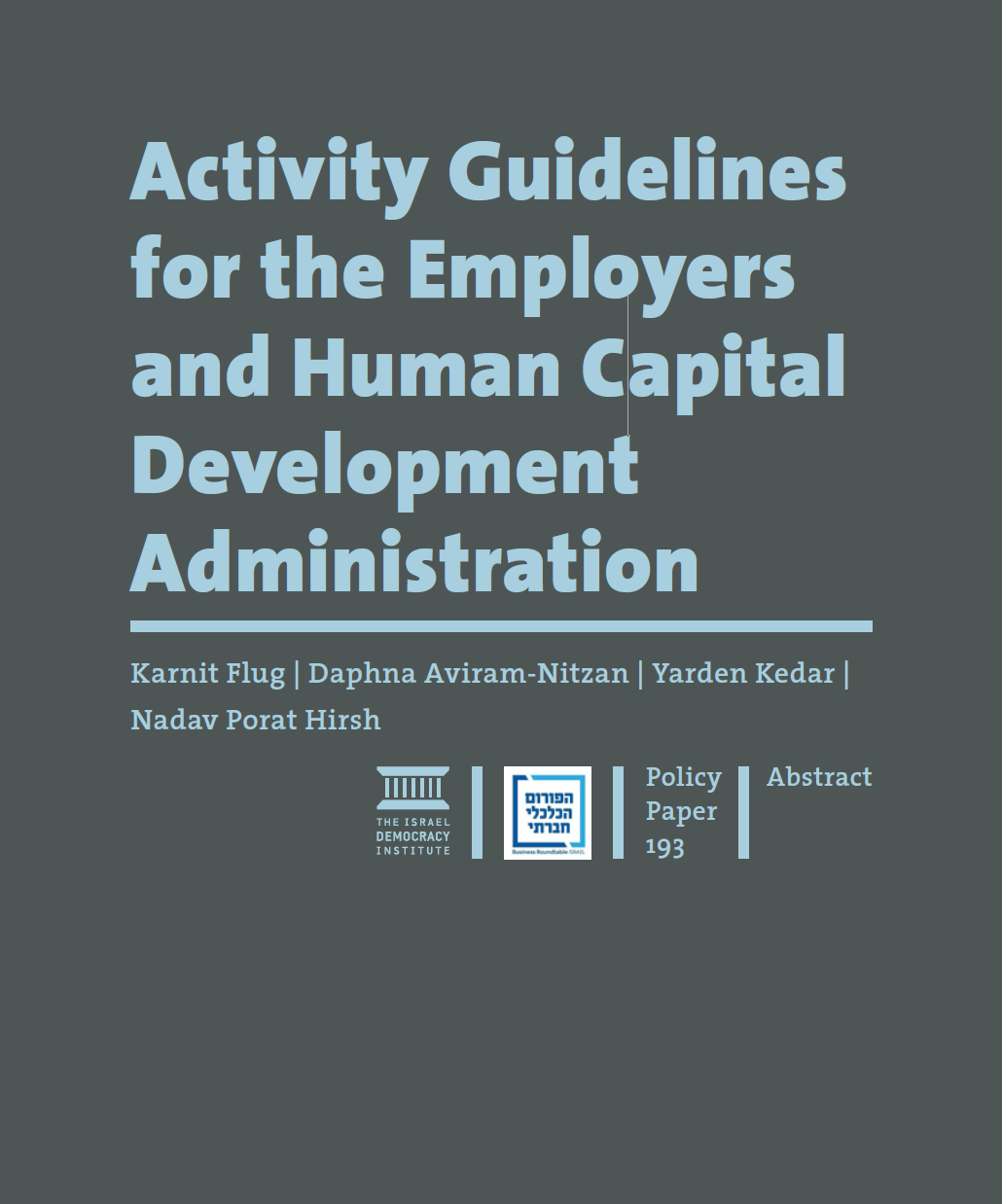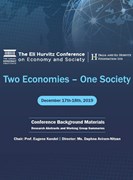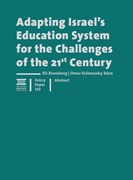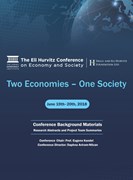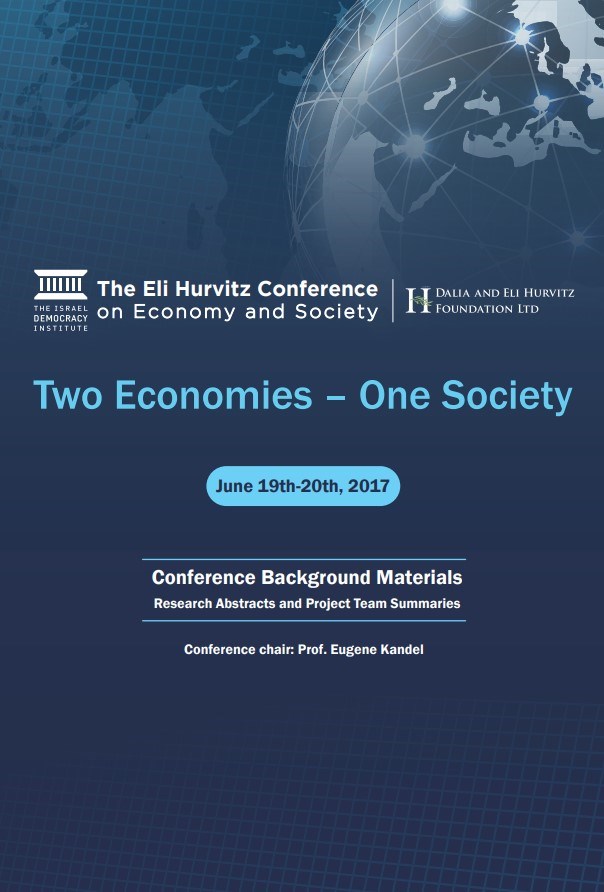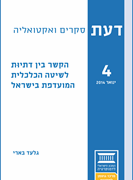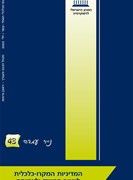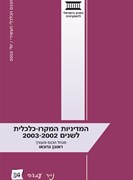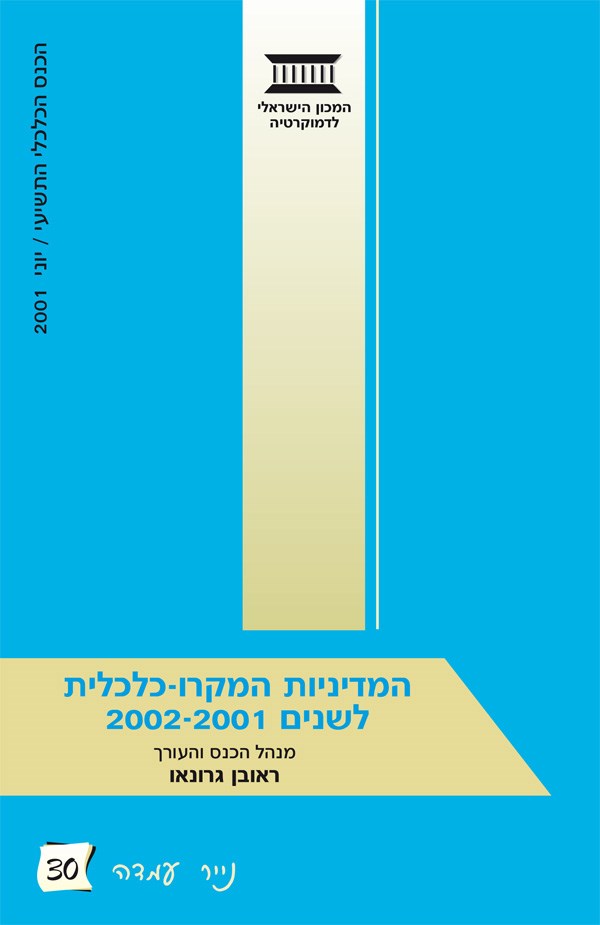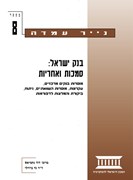

Publications Regarding Economic Policy
Articles

MKs Lapid; Gantz; Elkin; Lazimi: IDI’s Eli Hurvitz Conference Continues for its Second Day
Written By: The Israel Democracy Institute
Press Release | IDI Eli Hurvitz Conference 2025 | May 28

Innovation Meets Regulation: Israeli Tech Founders, Government Officials, and the Future of Civil Service, This Afternoon at IDI’s Eli Hurvitz Conference
Written By: The Israel Democracy Institute
Press Release | IDI Eli Hurvitz Conference 2025 | May 27, Afternoon Session

President Herzog; BOI Governor; MK Mansour Abbas; PMO’s Prof. Avi Simhon and Other Key Leaders Kick Off the Eli Hurvitz Conference
Written By: The Israel Democracy Institute
Press Release | IDI Eli Hurvitz Conference 2025 | May 27, Morning Sessions

The Proposed "Softened Rabbis Bill" Complicates the Budgeting Process for Religious Councils
Written By: Dr. Ariel Finkelstein
The recently proposed bill runs counter to accepted budgeting principles and undermines the autonomy of local governance.

Early Childhood Daycare Subsidies in Israel in Different Sectors
Written By: Gabriel Gordon,
A survey of daycare subsidies in Israel and recommendations for improved criteria that would encourage participation in the labor market among the ultra-Orthodox.

Employee Skills in Israel: Overview and Gap Analysis
Written By: Prof. Yotam Margalit, Zak Hirsch
Technological advancements, rapid globalization, and structural changes in the Israeli economy over the past few decades have led to significant shifts in the demand for workers and in the tasks required of them, as well as in the characteristics of their skills and qualifications. This study offers insights on these questions using a variety of data sources and by employing two distinct empirical approaches.

A More Targeted Approach to IDF Reservist Compensation
Written By: Dr. Carmit Padan
Israeli reserve soldiers are making unimaginable sacrifices to protect their country. To rise to the challenge of meeting the IDF's expanded personnel needs, Israel's policy solutions must be as diverse as are the reservists serving this nation. A "one-size-fits-all" compensation approach will not cut it.

High Cost of Living | Eli Hurvitz Conference
High cost of living in Israel is addressed at the Eli Hurvitz Conference on Economy and Society.
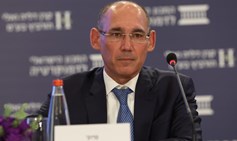
Where Is The Israeli Economy Headed? | Eli Hurvitz Conference
Bank of Israel Governor: “the Israeli economy has experienced a significant shock in recent months following the proposed changes to the judicial system... continued uncertainty has significant economic costs.”

The Repeal of the Tax on Disposable Utensils: What Lessons can we Learn?
Written By: Prof. Yuval Feldman, Itamar Popliker
Even though the tax seems to have reduced the use of disposable utensils, its repeal demonstrates that a sustainable change in behavior requires additional measures, including running information campaigns tailored to the ultra-orthodox, making alternatives available, and encouraging their use.

Precautionary Savings – It's High Time
Written By: Prof. Karnit Flug, Prof. Eugene Kandel
The majority of the population in Israel lacks significant precautionary savings and thus are not capable of dealing with Mega-Macro Shocks - mandatory precautionary savings should be put in place for all citizens for use during such a crisis.

A Just Transition to a Low Carbon Economy
Written By: Prof. Nathan Sussman, Daphna Aviram-Nitzan, Hila Shoef Kollwitz
Implementing IDI's Israel 2050 program for emissions reduction is not only an urgent necessity, but also highly beneficial in economic terms.

Israelis Pessimistic on the Country's Outlook but Hopeful on Peace with UAE
Written By: Prof. Tamar Hermann, Dr. Or Anabi
With the Jewish New Year approaching, Israelis are pessimistic on the country's outlook but hopeful on peace with UAE; 41% of Israelis think the upcoming year will be worse than the last; 68% of Israelis think that Israel will be heading to elections when the budget compromise between Likud and Blue and White expires in December.

The Crisis Has Hit at the Core of the Labor Market
Written By: Daphna Aviram-Nitzan
The current crisis threatens the heart of the labor market with 400,000 workers between the ages of 35-54 designated as "temporarily absent from work" due to the coronavirus
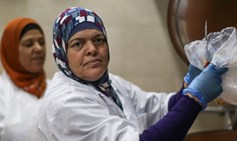
Arab Society in the Wake of the Coronavirus: Policy Recommendations
Written By: Dr. Nasreen Haddad Haj-Yahya, Ayman Saif
After three contentious election campaigns, Israel's new government has been sworn in. IDI's experts weigh-in with their recommendations on the most important issues on the agenda. Dr. Nasreen Hadad Haj-Yahya and Ayman Saif on the urgent challenges facing the 35th government to address the significant economic gaps that between Israel's Jewish and the Arab populations.
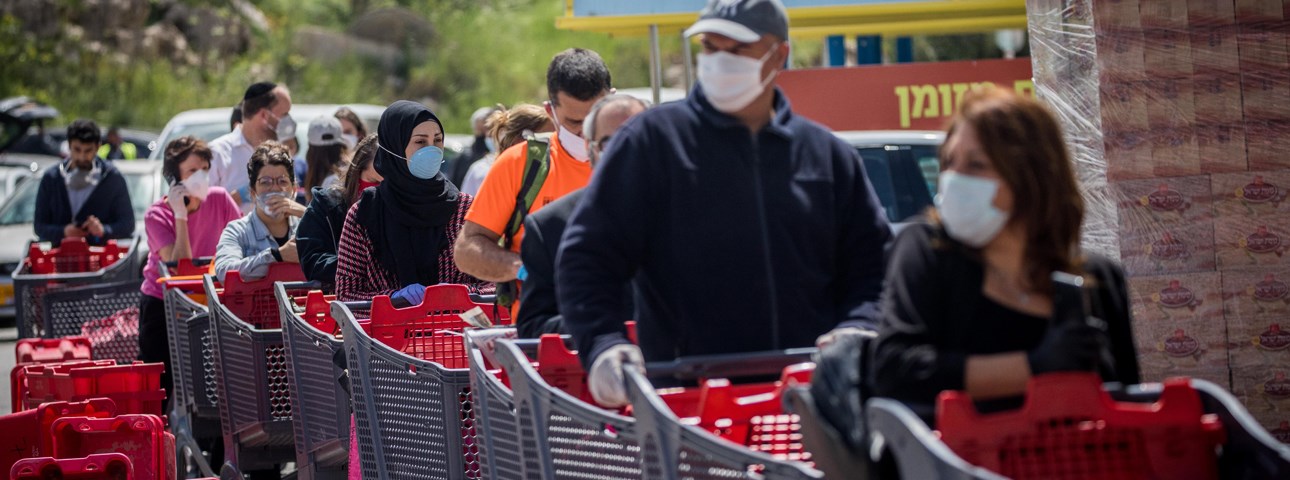
Second Wave is a Matter of Time
More than half of Israelis think a second wave is a matter of time and 39% think that the return to normalcy is too fast

Coronavirus and Unemployment in Israel
Written By: Daphna Aviram-Nitzan
Daphna Aviram Nitzan presents an analysis of unemployment in Israel in the wake of the coronavirus pandemic.

The Coronavirus: Israel's Economy and Economic Policy
Written By: Prof. Karnit Flug
Prof. Karnit Flug's press briefing today focued on the Coronavirus’ effect on the Israeli economy and policies that could mitigate the damage inflicted by the pandemic.

The COVID-19 Crisis - Economic Impact and Economic Policies
Written By: Prof. Karnit Flug
What will be the economic ramifications of the coronavirus outbreak on the Israeli economy? Prof. Karnit Flug explains.
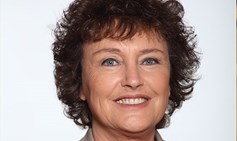
Karnit Flug Named William Davidson Fellow
The Israel Democracy Institute Names Former Bank of Israel Governor Karnit Flug William Davidson Fellow - new partnership will focus on ensuring Israel’s continued economic vitality.

The Israeli Economy: A Report Card
Written By: Prof. Karnit Flug
Prof. Karnit Flug, former Governor of the Bank of Israel and currently Vice President for Research at the Israel Democracy Institute, analyzes the strengths and weaknesses of the Israeli economy.

Human Capital in Israel
Developing human capital in Israel is the key to narrowing the labor productivity gap as a key to reducing income disparities
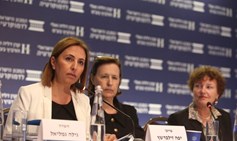
How Do We Adapt Our Labor Agreements to the 21st Century?
Eli Hurvitz Conference on Economy and Society – First Day, Second Session
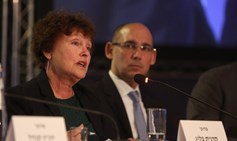
Ability to Make Economy Related Decisions Impaired
Prof. Karnit Flug, Vice President of IDI and Former Governor of the Bank of Israel spoke at the 2019 Eli Hurvitz Conference on Economy and Society: “With no government in place, the ability to make economy-related decisions is impaired. In the current situation, what is done depends entirely on what the Knesset Finance Committee is prepared to do."

Israel is in Danger of Becoming a Weakened State
Benny Gantz, Chair of the Blue and White party and former IDF Chief of Staff spoke at the 2019 Eli Hurvitz Conference: "Government ministers bicker daily with the professional echelon - a situation that harms Israelis"
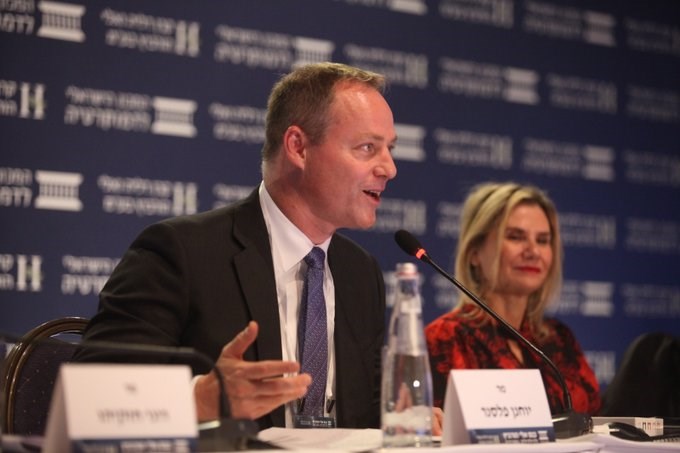
Israel’s Economy: Island of Stability with Troubling Trends
Yohanan Plesner, President of the Israel Democracy Institute and Prof. Eugene Kandel, CEO Start-Up Nation Central, open the two day conference, welcoming senior executives from the public and private sectors.

The Coming Capitalist Revolution
Written By: Prof. Yedidia Z. Stern
Profit remains the ultimate objective, but the focus should be on profit for all those with a stake in a company, and not just its shareholders

Ease of Doing Business 2020 Index
In response to the Ease of Doing Business 2020 index that was published this morning, Daphna Aviram-Nitzan, director of the Center for Governance and Economics at the Israel Democracy Institute, who leads the regulation reduction project at the Institute, commented on Israel moving up 14 slots to the 35th place after 5 points improvement last year.

Economic Policy - Professional Independence and Long Term Planning
Excerpts from the presentation of Prof. Karnit Flug, IDI’s newly appointed Vice President, at the ‘Globes’ Governors Conference”
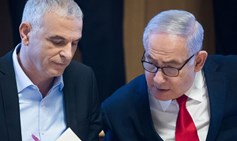
Quarter of the Population Gives Government's Policies a Failing Grade
Two and a half weeks ahead of the elections, a special IDI survey reveals that the Israeli public gives government economic policies a failing grade and supports increasing the budgets allocated to health, education, welfare, and public transportation services

Misery Loves Company
Written By: Dr. Asaf Malchi
In light of their demographic growth, the ultra-Orthodox community in Israel have to attempt to become part of in the broader Israeli society.

Towards the Elections: Prime Minister Netanyahu gets Mixed Grades
Written By: Prof. Tamar Hermann, Dr. Or Anabi
Prime Minister Benjamin Netanyahu is awarded high grades for improving Israel’s international standing (60%), enhancing the country's military strength (56%), and successfully contending with the Iranian threat (50.5%) but poor grades for failing to increase solidarity between Israel's different segments of society (51%) and on the question of personal integrity (49%).

The Next Destination of Young Ultra-Orthodox Couples
Written By:
How do young ultra-Orthodox couples cope with the housing crisis? The most recent figures on home-buying point to a change of the trend in the ultra-Orthodox internal migration. This change poses a challenge, but also an opportunity. How should the state respond?

Adapting to the Future Job Market
Written By: Daphna Aviram-Nitzan, Aharon Aharon, By: Alan Rosenbaum
Reframing the eco-system to prepare for Israel’s job market of the future.

Israel Climbs Five Spots in the World Bank’s Ease of Doing Business Index
Israel improved by five spots over last year in the index of 190 countries. In first place is New Zealand, followed by Singapore, Denmark, Hong Kong, and South Korea. The Ease of Doing Business Index is an international indicator of how easy it is to do business in various countries.
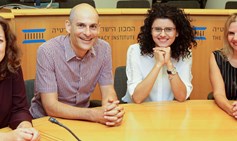
Meet the Next Generation of IDI Leaders
Written By: Rachel Cohen, Adv. Alona Vinograd, Dr. Nasreen Haddad Haj-Yahya, Daphna Aviram-Nitzan, Dr. Gilad Malach
Guaranteeing an independent Supreme Court. Integrating the Ultra-Orthodox into the IDF. Boosting participation of Arab women in the workforce. Improving the ease of doing business in Israel. These are some of the challenges facing IDI’s new cadre of program and center directors.
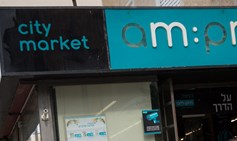
Shabbat in the City
Written By: Dr. Shuki Friedman, Adv. Gilad Wiener
A recent law stripped local authorities of the power to decide on allowing commercial activity on Shabbat and handed it over to the Minister of the Interior, a development which was met with public uproar. Would it not be better to leave these powers in the hands of the municipalities, which act according to the profile of their resident population? Dr. Shuki Friedman makes the case for leaving these decisions in the hands of the local authority.

Is the Two-State Solution Still Relevant?
Written By: Prof. Tamar Hermann, Prof. Ephraim Yaar
Half of the Jewish Israeli public think that Palestinians deserve an independent state, but believe that the two-state solution would be impossible to implement.

Survey of Public Attitudes on Economic Policy (June 2018)
On the occasion of this year’s Eli Hurvitz Conference on Economy and Society (June 19-20) the Israel Democracy Institute published a special survey to assess public opinion on Israel’s economic future.
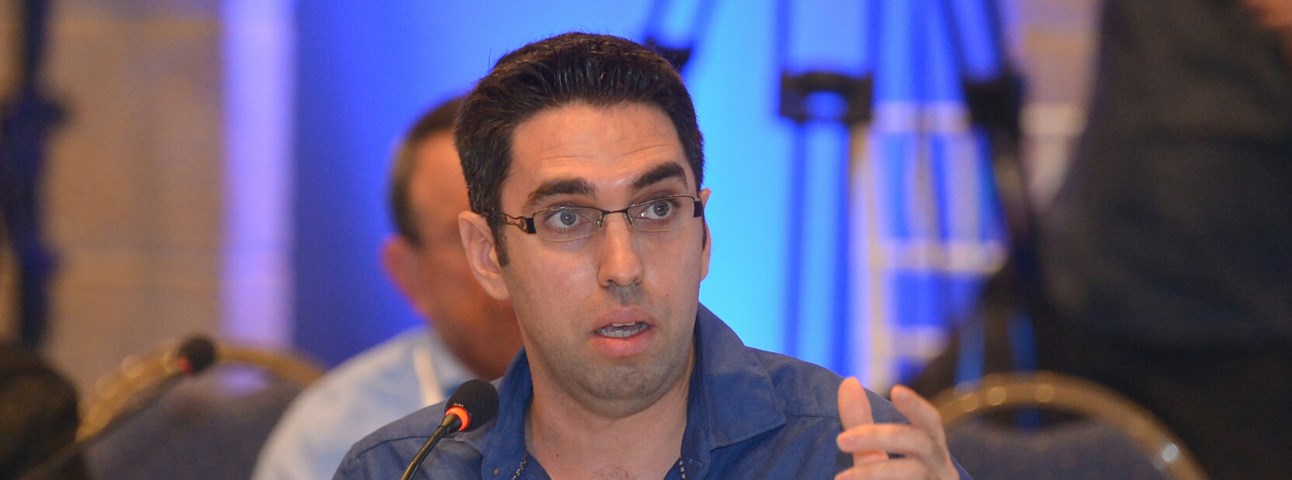
Israel needs a Paradigm Shift: Greater Compatibility Between Human Capital and the Economy
Written By:
Israel suffers from a shortage of skilled workers in manufacturing industries and hi-tech and an overflow of the service sector; priorities in the allocation of public resources for the training of human capital must be changed to better fit the needs of the economy.
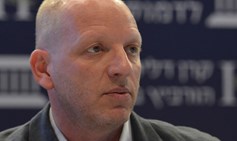
Israel’s future labor market needs updated models
Written By: Prof. Yotam Margalit
The number of vacation days in Israel is among the lowest in the world. Research by Prof. Yotam Margalit presents a new model which will ensure a minimum of 18 vacation days for each worker.
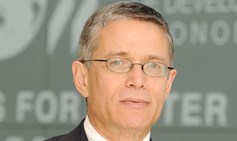
Top OECD Official: Israel Must do more to Integrate Arabs and ultra-Orthodox into the Economy
Dr. Peter Jarrett, the head of the Country Studies Division at the OECD, says the government must do more to integrate all Israelis into the economy if it is to continue to prosper and grow. "Boasting that Arabs and Ultra-Orthodox Aside, Israel's Situation is Excellent - is Simply shortsighted and Foolish."

Mission: Open a factory in Israel in 18 months
An ambitious plan aims at slashing the 4-6 years it currently takes to pass all the regulatory hurdles in Israel

A Decline in the Number of Ultra-Orthodox Men in the Workforce
Written By: Dr. Gilad Malach
For the first time since 2013- a decline in the number of ultra-Orthodox men in the workforce

Ultra-Orthodox and Affirmative Action: Justice and not Charity
Written By: Dr. Asaf Malchi
For the ultra-Orthodox sector and for us as a society, justice is not charity.
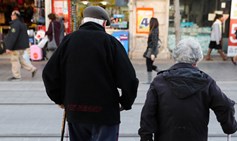
Living in Dignity
Written By: Prof. Eytan Sheshinski, Rachel Zaken
Our Democracy Index shows that while Israel’s citizens love their country and are optimistic about its future, they feel a lack of confidence about their personal futures.

Flexonomics
Written By: Ilan Evyatar
In a dynamic labor market, challenged by technological disruption and increasing longevity, flexibility is key.

Bank of Israel's Karnit Flug: 'Ensure More Ultra-Orthodox Males Receive a Complete Secular Education'
srael's GDP is 40 percent lower than that of the U.S. and its level of productivity is 33% less than most OECD countries, according to a presentation by Dr. Karnit Flug, governor of the Bank of Israel.

Israel Democracy Institute's First-Ever Economic Survey
As the Israel Democracy Institute's annual Eli Hurvitz Conference on Economy and Society kicks off today in Jerusalem, IDI's Guttman Center for Public Opinion and Policy Research sheds new light on Israeli socioeconomic discourse.

Bank of Israel Governor Karnit Flug, Ministry of Finance Director-General Shai Babad to Headline Eli Hurvitz Conference on Economy & Society
Israel Democracy Institute's leading economic conference will focus on integrating innovation into the government, actuarial crisis,
and role of business press, among other topics

The High Price of Ignoring Poverty
Written By: Dr. Sami Miaari
Following the publication of the Poverty Report, Dr. Sami Miaari points out the large percentage of Arab Israelis that live in poverty. He says the current situation requires a new strategy and economic investment on several levels simultaneously. This article first appeared on Times of Israel.
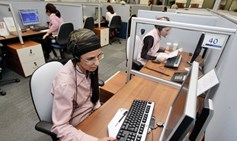
The Challenges of Promoting Employment in the Ultra-Orthodox Community
Written By: Dr. Gilad Malach
Dr. Gilad Malach, who heads IDI's research program on the ultra-Orthodox community in Israel, discusses the barriers that weigh down attempts to increase the employment rate in the Haredi community and suggests possible solutions.

Shemitat Kesafim: The Year of Escape from Debt
Written By: Prof. Benjamin Porat
Dr. Benny Porat discusses the precept of debt cancellation during the sabbatical year (Shemita) and proposes ways in which to update this practice to suit the economics of contemporary Israel and create a model society.

Shmita: Rest, Share, Release
Written By: Prof. Yedidia Z. Stern
An exploration of the existential, social, and economic dimensions of the Shmita year, that calls for bringing together social, moral, cultural, religious and national forces to implement the idea of Shmita in non-agricultural and national contexts in Israel.

A New Social-Economic Agenda for Israel
Written By: Momi Dahan
In an op-ed, originally published on the Ynet website, IDI Senior Fellow Dr. Momi Dahan reflects on the wave of social protest of the summer of 2011 and stresses that the response to the protest must be a new social-economic agenda.

Before the Next Shock Hits
Written By: Avi Ben-Bassat
In this article, originally published in Haaretz on April 1, 2010, IDI Senior Researcher Prof. Avraham Ben-Bassat warns that Israel's policy of reducing taxes should be frozen since it may precipitate an economic crisis, and advocates giving preference to increasing public spending while preserving the economy's stability.

Gamblers in Disguise
Written By: Prof. Yedidia Z. Stern
Prof. Yedidia Z. Stern examines the reality of the ongoing financial crisis, and tries to explain how such a rational industry gets carried away with reckless decision-making procedures.

The Employment Revolution and the Haredim Who Are Being Left Behind
Written By: Dr. Asaf Malchi
With 50% of young Haredi men expected to enter the labor market actually those with poorer skills and abilities, there is an urgent need for an in-depth rethinking about Haredi education.

Active Labor Market Policy Must Become Priority
Written By: Prof. Yotam Margalit
For Israel's economy to grow, significant investment in building a strong and effective infrastructure for occupational training and reemployment is critical.

Eli Hurvitz Conference on Economy and Society
With the featured participation of: Bank of Israel Governor, Education Minister, Economy Minister, Director-General of the Finance Ministry, Director-General of the Prime Minister Office, Chairman of the Histadrut Labor Federation, Director-General of Bank Leumi, Director General of Microsoft Israel and other VIPs
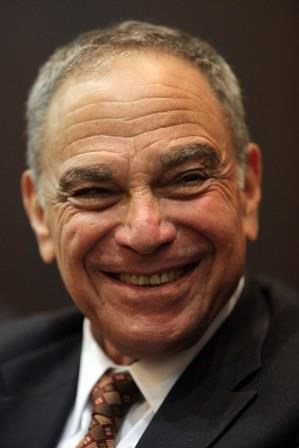
Professor Eytan Sheshinski joins the Israel Democracy Institute (IDI) as a Senior Researcher in the Center for Governance and the Economy
Top Israeli economist, Professor Eytan Sheshinski, has joined IDI as a senior researcher in the Center for Governance and the Economy, under the leadership of Dafna Aviram-Nitzan.

